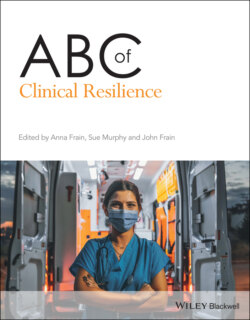Читать книгу ABC of Clinical Resilience - Группа авторов - Страница 13
Why now?
ОглавлениеIn the twenty‐first century, healthcare workers face multiple local and global challenges to their resilience. In our initial chapters, we explore the emotional impact of working in healthcare (Chapter 2). Healthcare has both challenges and rewards. These are considerable, and we are all familiar with the feeling of seeing a life saved, a goal achieved, perhaps soon followed by the despair of a tragic outcome or setback. Every interaction involves the care of – and communication with – a fellow human with needs and vulnerabilities. The fact that professionals sometimes struggle is predictable and understandable. Often, we begin practicing these skills required for these experiences at a time in our lives when we are still maturing and adapting to the emotional landscape of adulthood. Learning to empathise with the suffering of others can be difficult. In addition to this, the transition from the classroom to the uncertainties of clinical practice can engender feelings of being unable to cope and not being good enough. Often referred to as ‘imposter syndrome’, Gottlieb et al. found rates of 22–60% in physicians and physicians in training (see Chapter 4). Gender, low self‐esteem and institutional culture are risk factors, while social support, validation of success, positive affirmation and personal and shared reflections were protective (Gottlieb et al., 2020). Feeling unsupported as we make our first clinical decisions can only exacerbate further feelings of being a fraud. Imposter syndrome is associated with increased risk of burnout and suicide.
Our patients require us to be cognitively ‘at the top of our game’ during every encounter. Diagnostic error is unfortunately common, and faulty cognition is a contributor to this. Evidence from neuroscience increasingly supports a link between our mood and cognition. This was recognised not only in the context of mental health but increasingly in the context of clinical reasoning. We discuss this in Chapter 3.
In addressing our cognitive performance, we need to consider our ‘career cycle’ (see Chapter 4). Our physical and mental abilities change over a working lifetime. In addition, our knowledge base and clinical experience change over time. There are transitions during our career (promotions, learning new procedures, complaints, personal life events) when our resilience may be more challenged and our propensity to burnout increased (Puddester et al., 2009). During these times, our likelihood of making a major mistake rises. Chapter 4 discusses these phases and strategies for coping with them.
Since the 1960s, heart rate variability (HRV) has been recognised as part of the stress response. For example, patients with depression have reduced HRV. Our stress response, of which HRV is part, evolved over thousands of years and for a different stress landscape. Change, including in healthcare, proceeds at an increasingly rapid pace, and we have not necessarily adapted to this. Many healthcare workers report practicing in a state of constant stress (NHS England, 2018). In turn, our cognitive performance and clinical decision‐making is impaired. In Chapter 5, we outline the physiology of well‐being.
John Donne’s assertion of our being ‘involved in mankind’ suggests that a connection or kinship with others should be mutually beneficial for all – as Donne also wrote, ‘No man is an island’.
There is a responsibility to be cooperative with others in return for a right to receive cooperation and support from others. This is an affirmation of life and is reflected in the quality our relationships with our patients and colleagues. I, as an individual, my patients, my colleagues, my employer and regulator are all involved in mankind and connected to one another. In healthcare, as in life, we can achieve more for our patients through cooperation. Our singular well‐being is dependent on our working together and only brought into being by our ‘intelligent kindness’ towards one another. This is considered at length in Chapter 6.
The individual practitioner cannot be resilient alone, and so we have to consider the role of teams on patient care and staff resilience. Riskin et al. demonstrated the effect of rudeness in healthcare teams and of a culture of rudeness in the working environment, both on procedural tasks and, even more so, on the communication tasks which underpin good clinical decision‐making and effective patient treatment (Riskin et al., 2015). Kindness to patients improves their health outcomes. Kindness to each other improves patient safety. Organisational kindness results in resilient professionals in a safer environment with better patient outcomes. It is a virtuous circle. We discuss this further in Chapters 7 and 8. Chapter 9 looks at resilience in practice and how approaches such as the ‘most respectful interpretation’ in assessing the motivation and intentions of others can be transformative in the relationships of healthcare professionals both with each other and with our patients.
